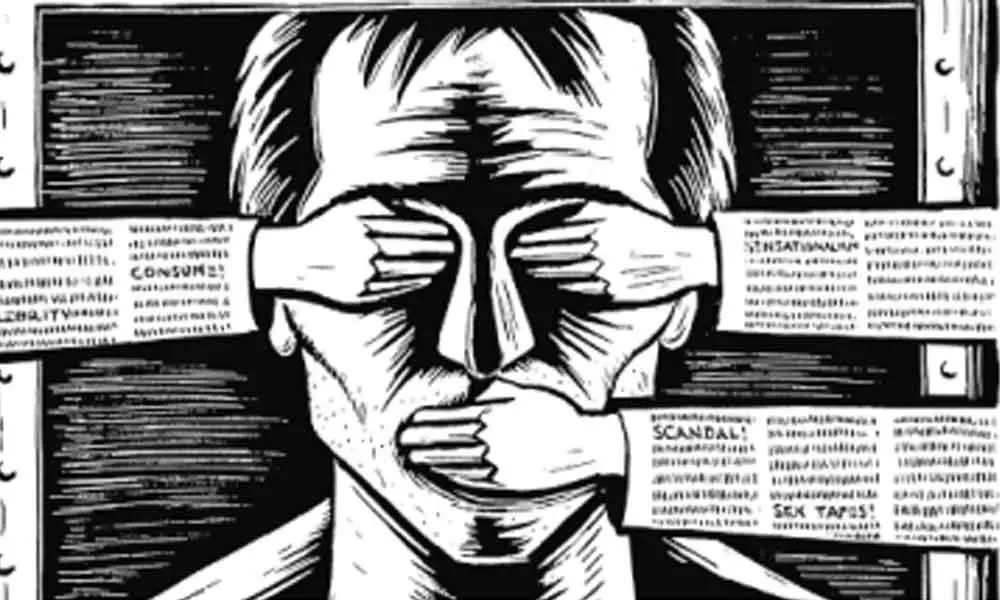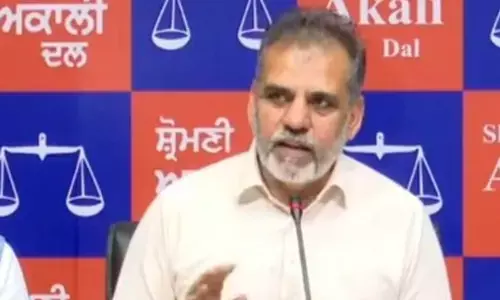Democracy or 'Kakistocracy'?

Democracy or ‘Kakistocracy’?
The journalists, critics and social media writers today are facing false cases foisted by the State and Police. A senior journalist is fighting a sedition case for criticising the Centre’s policies
The journalists, critics and social media writers today are facing false cases foisted by the State and Police. A senior journalist is fighting a sedition case for criticising the Centre's policies. A doctor in the Government Hospital was victim of abuse of the state power but rescued by the High Court. One news web portal Telugu One.com is out of the cobweb of false cases, thanks to the High Court of Andhra Pradesh which gave a strongly worded judgement on 13th September quashing all the false charged slapped in an FIR by CID
(https://www.livelaw.in/news-updates/registration-of-crime-by-police-without-material-allegation-to-constitute-cognisable-offence-creates-impression-of-kakistocracy-may-lead-to-anarchy-ap-hc-read-petition-162863#.X13DpIHF3uY).
The judgement serves two purposes, one – immediate relief to editors and proprietors of Telugu One. Com besides giving a strong message to police not to meddle with freedom of expression to please the political bosses. Second purpose it served is it explains how the false sections could be thwarted out. The judgement is ray of hope in the pitched darkness of anti-criticism vengeance spread all over the nation. Had it happened two decades ago, the Home Minister and Addl. DGP would have resigned in shame.
Justice M Satyanarayana Murthy asked: Are we, now, living in democracy or Kakistocracy?
Telugu One.com office was ransacked, and a FIR with false charges was slapped against it. The news portal has just uploaded an audio clip of leaked conversation from CM's office criticising the rule of the Jaganmohan Reddy government (listen the talk https://www.youtube.com/watch?v=aG2AHRjb4Y8).
Their talk with each other had two salient points - AP people's suffering was the worst among all the States in India, and government failed to address the proliferation of Covid virus. The news portal's headquarters is in capital city of neighbouring state, Hyderabad, wherein a team of CID police officers landed and took away dozens of computers and other electronic equipment, which High Court called as "nothing but exhibiting over enthusiasm by the officials to please the political party in power".
Audio clip of TeluguOne.Com
The web-portal filed a writ petition for quashing FIR against their Managing Director and others. Four false charges are made against him in FIR.
♦ Crime under Sections 188 of IPC alleging Disobedience to order duly promulgated by public servant (Six months Imprisonment & Rs 1000 fine) "Whoever, knowing that, by an order promulgated by a public servant lawfully empowered to promulgate such order, he is directed to abstain from a certain act, or to take certain order with certain property in his possession or under his management, disobeys such direction, shall, if such disobedience causes or tends to cause obstruction, annoyance or injury, or risk of obstruction, annoyance or injury, to any person lawfully employed, be punished…."
♦ Section 505 (2) of IPC Statements conducing to public mischief: (1) ] Whoever makes, publishes or circulates any statement, rumour or report, (b) with intent to cause, or which is likely to cause, fear or alarm to the public, or to any section of the public whereby any person may be induced to commit an offence against the State or against the public tranquillity; or….(3 years Imprisonment or fine)
♦ Section 506 of I.P.C Punishment for criminal intimidation.—Whoever commits, the offence of criminal intimidation shall be punished with imprisonment of either description for a term which may extend to two years, or with fine, or with both; If threat be to cause death or grievous hurt, etc
♦ Section 54 of the Disaster Management Act, 2005 Punishment for false warning.—Whoever makes or circulates a false alarm or warning as to disaster or its severity or magnitude, leading to panic, shall on conviction, be punishable with imprisonment which may extend to one year or with fine. —Whoever makes or circulates a false alarm or warning as to disaster or its severity or magnitude, leading to panic, shall on conviction, be punishable with imprisonment which may extend to one year or with fine."
How imaginative the AP State CID Police could be? Unimaginable. Just for uploading an audio critical of CM's actions four criminal offences were foisted. Anybody who listens to the audio will understand how the police was atrocious. In fact, the police is causing serious harm to Jaganmohan Reddy's government with such illegal and abusive actions.
The High Court examined each section and questioned on facts and law the deficiencies. It found, among papers submitted, no details about statement or its circulation, rumour content or alarming news based on religion, race, place of birth, residence, language, caste, or community. Each Police charge collapsed as follows:
♦ Section 188 of IPC: There is nothing to show that crime u/s 188 of I.P.C. (disobedience to order of public servant) was committed. First of all, there should be some order or ordinance promulgated by any public servant, secondly accused should have disobeyed it.
Without these two the offence does not arise. As per Section 195(1)(a)(i) of Cr. PC it is mandatory to have a written complaint from the public servant. In the absence of such complaint, its non-compliance is not possible and hence it would vitiate the prosecution.
♦ Section 505 of IPC: How can talk between two persons about general administration cause enmity? No legal knowledge is needed to say so. Common sense is essential of course. There was no material to show feeling of enmity, hatred between different groups, as police failed to show existence of any group at all.
Hence, HC found no offence u/s 505(2) was constituted and said: "the CID being the instrumentality of the State working under the thumb of the State, for the reasons best known to them by abuse of process of law and registered this crime against the petitioner".
♦ Section 506 of IPC: The bench found no threat to the public or causing alarm that could make an offence u/s 506 IPC also as. "Mere expression of any words without any intention to cause alarm would not be sufficient to bring in the application of this section". Slapping of each of section is 'abuse of law'.
♦ Section 54, DMA: When and where they created a false alarm? Section 54 of the Disaster Management Act deals with offence of creating false warning as to disaster or its severity or magnitude, leading to panic. This is punishable with imprisonment up to one year or with fine and it is a non-cognizable offence, which means there shall be a complaint.
Section 60 of the Disaster Management Act, says no court shall take cognizance of an offence under this Act except on a complaint made by (a) the National Authority, the State Authority, the Central Government, the State Government, the District Authority or any other authority or officer authorised in this behalf by that Authority or Government, as the case may be; or (b) any person who has given notice of not less than thirty days in the manner prescribed, of the alleged offence and his intention to make a complaint to the National Authority, the State Authority, the Central Government, the State Government, the District Authority or any other authority or officer authorised as aforesaid. There is no such complaint at all. The HC held that registering crime against a journalist under Section 54, DM Act is a grave illegality by abusing the process of law".
The High Court admonished the state police for registration of a crime without any material allegation to constitute cognisable offence, which resulted in harassing the public in the guise of investigation that could lead to anarchy and that such acts of the police created an impression that the people are living in a "Kakistocracy", though they are living in a democracy.
The High Court was surprised at this kind of FIR which reflected the lack of minimum knowledge about law, giving the impression that the department is manned by an officer without any administrative control. The judge reminded police of their duties, saying: "Everyone knows about the unpleasant relationship between police and community which creates difficulties during investigation.
Police expect that all difficulties in society should be solved by the police, but the basic duty of police is protection of human life, liberty and property and enforcement of law and order".
(The writer is Dean, School of Law, Bennett University, and former Central Information Commissioner)










